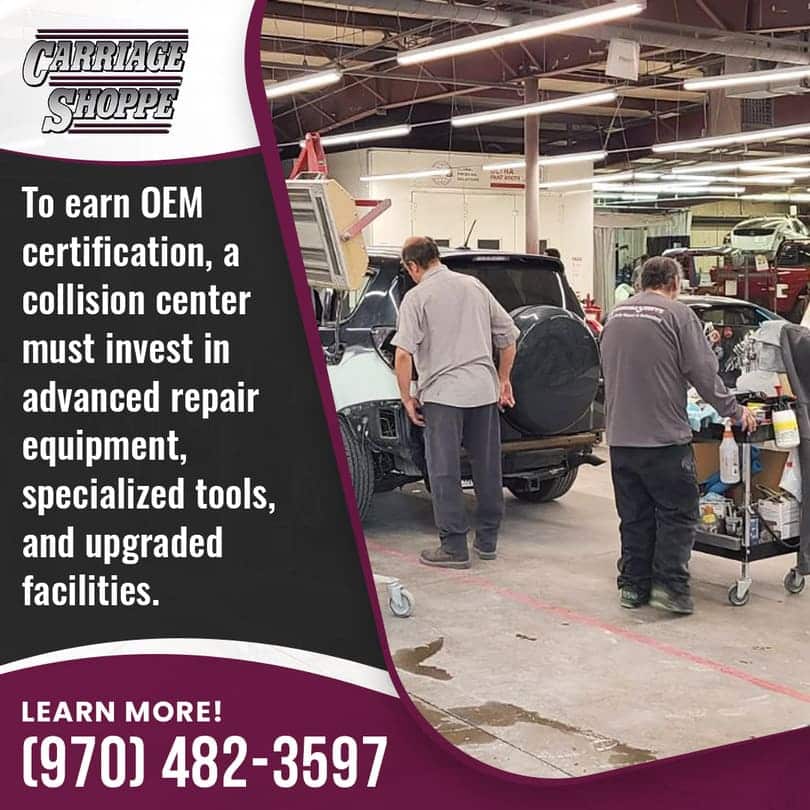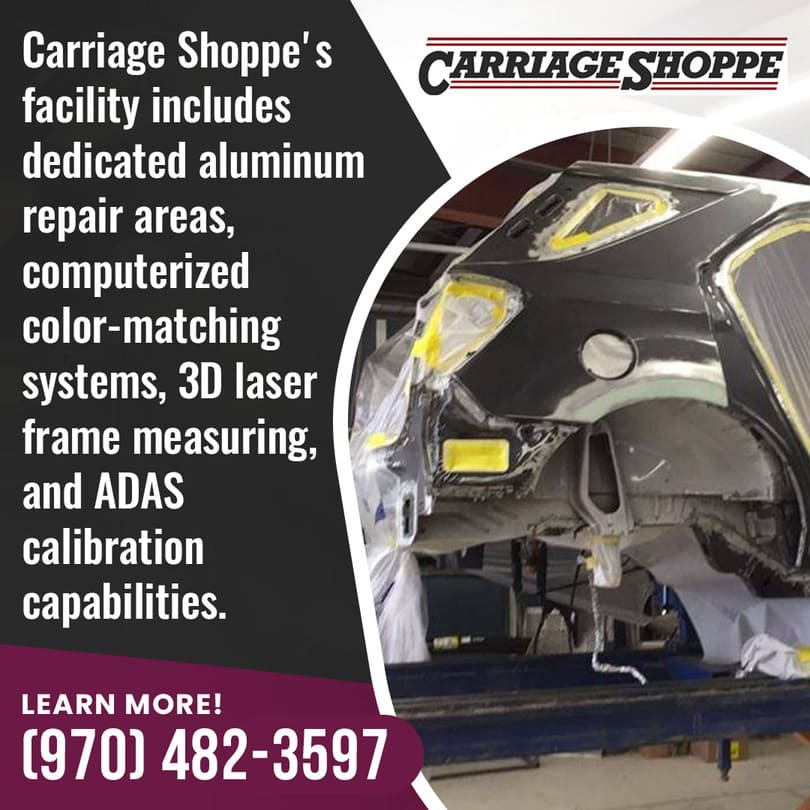As experienced collision repair professionals, we’ve witnessed countless vehicles arrive at our auto collision shop after being improperly repaired at non-certified facilities. The difference between quality auto collision repair and substandard work can mean the difference between life and death in your next accident. At Carriage Shoppe, we’ve dedicated ourselves to providing Fort Collins drivers with OEM-certified car collision repair that restores your vehicle to factory specifications.
You deserve collision repair in Fort Collins, CO, that protects your family’s safety and your financial investment. Our Fort Collins collision center maintains certifications from major manufacturers because we believe your vehicle’s structural integrity and safety systems are too important to compromise. When you choose our auto collision repair in Fort Collins, CO, you’re selecting a collision center that follows the same exacting standards used when your vehicle was originally built. We use manufacturer-approved procedures, genuine OEM parts, and factory-trained technicians who understand that your vehicle’s protection systems must function flawlessly when you need them most.

OEM-Certified Auto Collision Repair Fundamentals
OEM certification represents formal recognition from vehicle manufacturers that a collision center meets their exacting standards for equipment, training, procedures, and parts usage. Original Equipment Manufacturer certification requires that auto collision repair be performed according to the same specifications used when your vehicle was originally built. This certification requires continuous investment in technician training, specialized tools, and facility upgrades to keep pace with rapidly evolving automotive technology.
Certification Requirements and Standards
Modern OEM certification programs demand significant facility investments and ongoing commitments. Certified collision centers must maintain manufacturer-approved equipment, dedicated training programs, and regular facility inspections. These requirements provide that every car collision repair meets the same standards applied during original vehicle manufacturing.
The certification process involves thorough facility audits, technician testing, and equipment verification. Manufacturers inspect everything from welding equipment and measuring systems to paint booth specifications and calibration tools. This thorough evaluation process weeds out facilities that cannot meet the demanding standards required for proper collision repair in Fort Collins, CO.
Equipment and Technology Standards
OEM-certified facilities must invest in advanced diagnostic and repair equipment. Advanced 3D laser measuring systems, manufacturer-specific diagnostic scanners, and specialized welding equipment represent just the beginning of certification requirements. Many programs also require dedicated aluminum repair areas with contamination-free environments and specialized bonding equipment.
Paint and refinishing standards also demand significant investment. Certified facilities must maintain computerized color-matching systems, climate-controlled paint booths, and manufacturer-approved paint products. These requirements guarantee that refinishing work meets factory appearance standards and provides long-lasting protection.
At Carriage Shoppe, our multiple OEM certifications from Ford, Honda, GM, Nissan, KIA, and Hyundai demonstrate our commitment to maintaining the highest industry standards. Our auto collision shop investments in advanced diagnostic equipment, 3D laser measuring systems, and specialized repair tools confirm every repair meets manufacturer specifications for safety and performance.
Why OEM Certification Matters for Your Safety
The primary reason to choose OEM-certified car collision repair centers comes down to safety and proper restoration. Vehicle manufacturers engineer their cars with specific crash structures, crumple zones, and safety systems that must be restored precisely to function correctly in future accidents. When these systems aren’t repaired properly, they can fail to protect occupants during subsequent collisions.
Structural Integrity Protection
Modern vehicle safety depends on precise structural engineering that includes energy-absorbing crumple zones, reinforced passenger compartments, and carefully positioned airbag systems. OEM certification provides technicians who understand how different vehicle components interact with safety systems and can restore them to original specifications. Improper frame straightening can affect airbag deployment timing, while incorrect structural repairs can compromise crumple zone effectiveness.
Certified auto collision repair facilities use manufacturer-approved measuring systems to verify that structural repairs restore original geometry. Even minor deviations from factory specifications can substantially impact crash protection and vehicle handling characteristics. This precision requires specialized equipment and training that non-certified facilities often lack.
Advanced Safety Technology Integration
Modern vehicles feature complex ADAS technology that relies on precise sensor calibration and electronic integration. Features like automatic emergency braking, lane departure warning, and adaptive cruise control depend on cameras, radar, and other sensors positioned with millimeter accuracy. These systems require specialized calibration equipment and manufacturer-specific procedures after any auto collision repair in Fort Collins, CO.
ADAS calibration involves both static and dynamic procedures that must be performed according to exact manufacturer specifications. Improper calibration can result in safety features that malfunction, provide false warnings, or fail to activate when needed. The consequences of incorrect ADAS calibration can be life-threatening, making certified expertise indispensable.
Carriage Shoppe’s certified technicians utilize OEM-approved diagnostic and calibration equipment to confirm your vehicle’s safety systems function exactly as designed. Our ADAS calibration services restore automatic emergency braking, lane-keeping assistance, and collision avoidance systems to manufacturer specifications, providing the protection you depend on.
The Risks of Choosing Non-Certified Collision Repair
Choosing a non-certified auto collision shop exposes vehicle owners to multiple risks that can have serious safety and financial consequences. The most serious risk involves compromised safety systems that may fail to protect occupants during future accidents.
Safety System Compromises
Structural integrity represents the primary safety concern with non-certified repairs. Non-certified shops may lack the specialized equipment needed to properly assess and repair modern vehicle structures. Without 3D laser measuring systems, technicians cannot accurately determine if frame repairs have restored the vehicle’s original geometry.
Even small deviations from factory specifications can affect crash energy distribution and compromise occupant protection. Modern vehicles rely on precise structural engineering to manage collision forces and protect passengers. When car collision repair doesn’t restore this engineering, the vehicle may not provide adequate protection in subsequent accidents.
Technology System Malfunctions
Advanced Driver Assistance Systems present another major risk area for non-certified repairs. Vehicles with ADAS features require precise sensor calibration after any repair that affects sensor positioning. Non-certified shops often lack the manufacturer-specific calibration equipment needed for proper ADAS restoration.
This can result in safety features that don’t function correctly or provide false warnings that drivers learn to ignore. Malfunctioning ADAS systems can create dangerous situations where drivers expect safety assistance that isn’t available. The liability implications of improper ADAS calibration can be severe for both repair facilities and vehicle owners.
Financial and Warranty Implications
Warranty implications represent an important long-term consideration for non-certified repairs. Repairs performed by non-certified facilities may void manufacturer warranties or create disputes over coverage for future problems. Vehicle manufacturers can deny warranty claims if they determine that improper repairs contributed to subsequent failures.
Insurance complications can also arise from non-certified repairs. Some insurance policies specifically require OEM parts and certified repairs for full coverage. Using non-certified facilities might result in reduced claim payments or coverage disputes that leave vehicle owners responsible for additional costs.
At Carriage Shoppe, our OEM certifications and manufacturer-approved repair procedures protect your warranty coverage and provide insurance compliance, confirming that your investment remains fully protected throughout the Fort Collins collision center repair process.
Key Differences Between Certified and Non-Certified Repairs
The differences between OEM-certified and non-certified collision repair in Fort Collins, CO, extend far beyond surface-level cosmetic repairs. Certified facilities must invest in manufacturer-specific diagnostic equipment, training programs, and repair procedures that many independent shops choose to avoid due to cost considerations.
Training and Expertise Standards
Technician training represents one of the most notable distinctions between certified and non-certified facilities. OEM-certified technicians complete ongoing manufacturer training programs that cover new repair procedures, materials, and safety systems. This training provides them with knowledge not just on how to fix damage, but how their repairs affect overall vehicle performance and safety.
Non-certified technicians may have general auto collision repair experience but lack the specialized knowledge required for modern vehicle systems. Without manufacturer-specific training, they may not recognize the implications of repair decisions on safety systems, warranty coverage, or long-term vehicle performance. This knowledge gap can result in repairs that look acceptable but fail to restore full functionality.
Parts Quality and Compatibility
Parts usage represents another major difference between certified and non-certified repairs. OEM-certified facilities provide the use of genuine manufacturer parts that meet original specifications for fit, finish, and performance. These parts undergo rigorous testing to confirm they offer the same level of protection, durability, and compatibility as original components.
Non-certified shops often use aftermarket parts to reduce costs, but these components may not provide the same level of protection or compatibility. Aftermarket parts might fit differently, use inferior materials, or lack the same crash protection characteristics as genuine OEM components. While they may appear similar, these differences can substantially impact vehicle safety and performance.
Quality Assurance and Documentation
Certified car collision repair involves comprehensive documentation and quality assurance procedures that non-certified facilities may not follow. OEM-certified shops maintain detailed records of all repair procedures, parts used, and calibration performed. This documentation supports warranty claims, insurance coverage, and resale value while providing accountability for repair quality.
Quality assurance procedures also distinguish certified repairs. Certified facilities follow manufacturer-specific inspection procedures and maintain equipment calibration records to confirm consistent repair quality. These procedures help prevent defects and verify that repairs meet factory standards.
Our team at Carriage Shoppe follows strict OEM documentation and quality assurance procedures for every repair, maintaining complete records that support warranty coverage and demonstrate our commitment to manufacturer-approved restoration standards.
Modern Vehicle Technology Requires Certified Expertise
Modern vehicle technology has transformed auto collision repair from a primarily mechanical process into a sophisticated restoration requiring electronic expertise. Today’s vehicles contain dozens of electronic control modules, sensors, and interconnected systems that must be properly diagnosed and calibrated after collision repairs.
Advanced Material Requirements
High-strength materials require specialized repair techniques that demand certified expertise. Modern vehicles use ultra-high-strength steels, aluminum alloys, and composite materials that each require specific welding procedures, heat treatment, and joining techniques. OEM certification provides technicians with knowledge of these requirements and access to appropriate equipment.
Aluminum repair, in particular, requires separate facilities and specialized equipment to prevent contamination and verify proper bonding. Cross-contamination between steel and aluminum can cause galvanic corrosion that compromises structural integrity over time. Dedicated aluminum repair areas and specialized tools are necessary to prevent these problems.
Electronic System Integration
Modern vehicles integrate electronic systems throughout the structure, requiring careful consideration during collision center repairs. Wiring harnesses, control modules, and sensors are often embedded within structural components that may need repair or replacement. Certified technicians recognize these integration requirements and can properly restore electronic functionality.
The interconnected nature of modern vehicle systems means that repairs in one area can affect systems throughout the vehicle. Certified technicians use thorough diagnostic procedures to identify all affected systems and complete restoration. This systematic approach prevents problems that might not become apparent until after repair completion.
At Carriage Shoppe, our advanced technology capabilities include modern ADAS calibration equipment, dedicated aluminum repair facilities, and complete diagnostic systems that complete restoration of your vehicle’s sophisticated technology systems.
Cost Considerations for OEM-Certified Repairs
The perception that OEM-certified auto collision repair in Fort Collins, CO, costs substantially more than non-certified repairs often stems from misunderstanding the total value proposition. While initial repair costs may be higher, certified repairs usually provide better long-term value through improved safety, warranty protection, and maintained resale value.
Value vs. Cost Analysis
Several factors influence the cost comparison between certified and non-certified repairs. OEM parts typically cost more than aftermarket alternatives, but they provide guaranteed fit, performance, and compatibility with vehicle systems. The labor costs at certified facilities may also be higher due to the additional training requirements and specialized procedures involved.
Certified car collision repair often reduces long-term costs through several mechanisms that non-certified repairs cannot provide. Proper repairs are less likely to require warranty work or corrections, reducing the total cost of restoration. The documentation and quality assurance procedures also prevent problems that might require additional repairs.
Insurance Coverage Benefits
Many insurance companies recognize the value of certified repairs and offer policy options that specifically cover OEM parts and certified procedures. These policies often result in better coverage and fewer disputes over repair procedures and parts selection. The reduced likelihood of future problems also benefits insurance companies through lower long-term claim costs.
At Carriage Shoppe, we work directly with insurance providers to maximize your coverage benefits and verify that certified repair procedures are properly documented and supported throughout the Fort Collins collision center claims process.

Choose Carriage Shoppe for Your Auto Collision Repair Needs
When collision damage affects your vehicle, trust the certified expertise of Carriage Shoppe for complete restoration to manufacturer standards. Our OEM certifications from major manufacturers, combined with I-CAR Gold Class technician training, provide your vehicle with the highest quality repair available in Northern Colorado.
Our collision repair services include structural repairs, advanced paint systems, ADAS calibration, and aluminum restoration capabilities. We work directly with all major insurance providers to verify seamless claims processing and guarantee our repairs meet or exceed manufacturer specifications.
Don’t compromise on your safety or your vehicle’s integrity. Contact Carriage Shoppe today at (970) 482-3597 or email officestaff@carriageshoppe.com to schedule your OEM-certified auto collision shop consultation. Experience the difference that manufacturer-approved repairs make for your vehicle’s safety, performance, and value.
